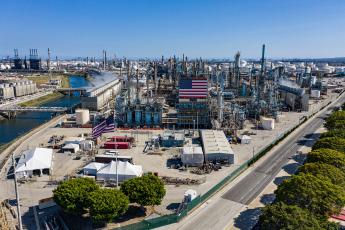Refiners urge New Mexico to reject California vehicle mandates
WASHINGTON, D.C., November 2, 2023—American Fuel & Petrochemical Manufacturers (AFPM) today filed comments in opposition to New Mexico’s proposed regulations to adopt California’s Advanced Clean Cars II (ACC II) standards through 2032.
Reintroduced “Break Free from Plastic Pollution Act” falls short, would penalize American manufacturing
WASHINGTON, D.C. – Rob Benedict, American Fuel & Petrochemical Manufacturers (AFPM) Vice President of Petrochemicals & Midstream, today released the following statement on the recently reintroduced Break Free from Plastic Pollution Act.
AFPM: Refiners urge Governor Murphy not to ban the sale of new gas & diesel vehicles
WASHINGTON, D.C., October 20, 2023—American Fuel & Petrochemical Manufacturers (AFPM) today filed comments in opposition to New Jersey’s proposed regulations to adopt California’s Advanced Clean Cars II (ACC II) standards that will fully ban in-state sales of new gasoline, diesel, flex fuel and traditional hybrid vehicles by 2035.
Bring back CFATS
In late July, Congress allowed a valuable program that enhances security at chemical facilities across the country to expire. The program is called the Chemical Facility Anti-Terrorism Standards (CFATS), and its primary mission is to protect chemical facilities from potential terror threats by addressing a wide range of possible vulnerabilities, including cyberattacks.
AFPM commends Senate introduction of the Choice in Automobile Retail Sales Act
WASHINGTON, D.C., October 19, 2023—American Fuel & Petrochemical Manufacturers (AFPM) President and CEO Chet Thompson issued the following statement in support of the Choice in Automobile Retail Sales (CARS) Act introduced by Senators Mike Crapo (R-ID) and Pete Ricketts (R-NE).
Refinery turnarounds 101: What are turnarounds and why do we need them?
Turnarounds—and the time they require—are critical for safe refinery operations and for the longer-term reliability of U.S. fuel production. But with a smaller number of U.S. facilities shouldering market demands, offline facilities can impact market dynamics. Where turnarounds are concerned, though, refineries take every measure possible to limit any potential disruptions to consumers and fuel supplies.
AFPM highlights Senator Monty Mason’s decisive vote tying Virginia to California’s vehicle ban
WASHINGTON, D.C. – The American Fuel & Petrochemical Manufacturers (AFPM) today launched a TV ad highlighting Senator Monty Mason’s decisive vote to keep Virginia aligned with California on the road to banning sales of new gas and diesel cars and trucks.
AFPM launches broadcast, cable TV campaign spotlighting Virginia’s adoption of California vehicle mandates
WASHINGTON, D.C. – The American Fuel and Petrochemical Manufacturers (AFPM) today launched the first TV ad in its issue campaign to raise awareness and build support for repealing the 2021 law that requires Virginia to enact California’s electric vehicle mandates and bans on sales of new internal combustion engine vehicles.
Updated: Why California vehicle bans & Virginia policy matter to AFPM
You may have seen that AFPM is shining a spotlight on the Commonwealth of Virginia and its unlikely tie to California’s looming ban on gasoline and diesel vehicles. Allow us to explain why, and also to lay out the current state of vehicle mandates and bans in Virginia.









